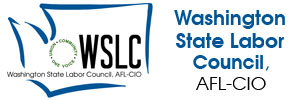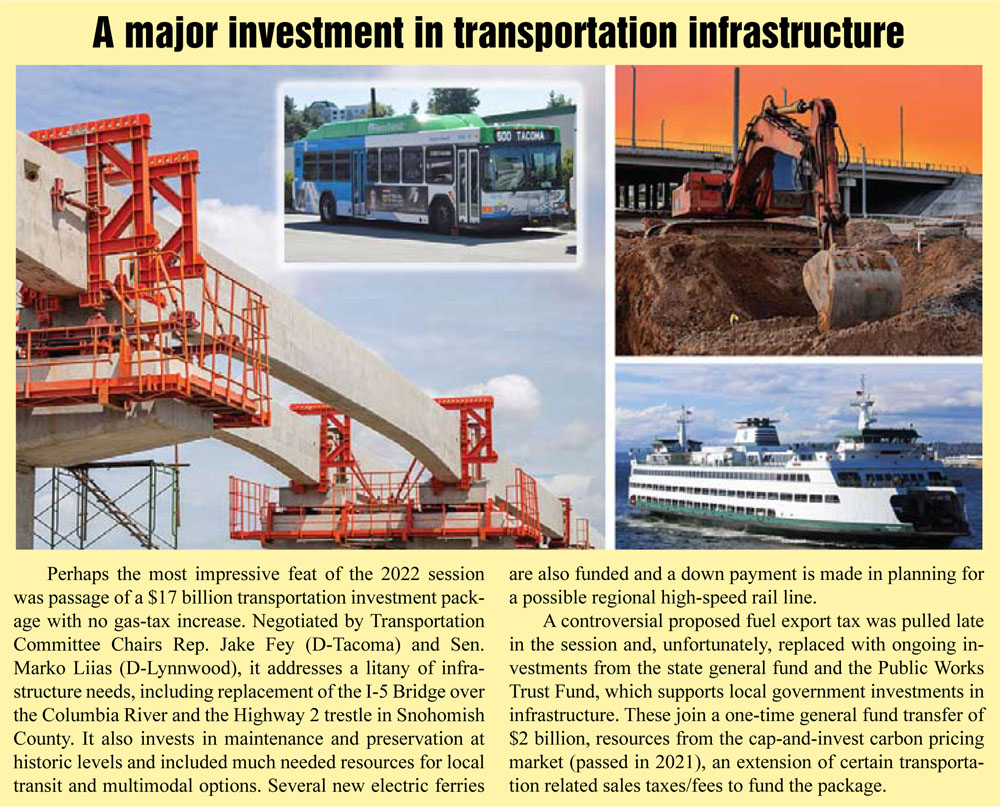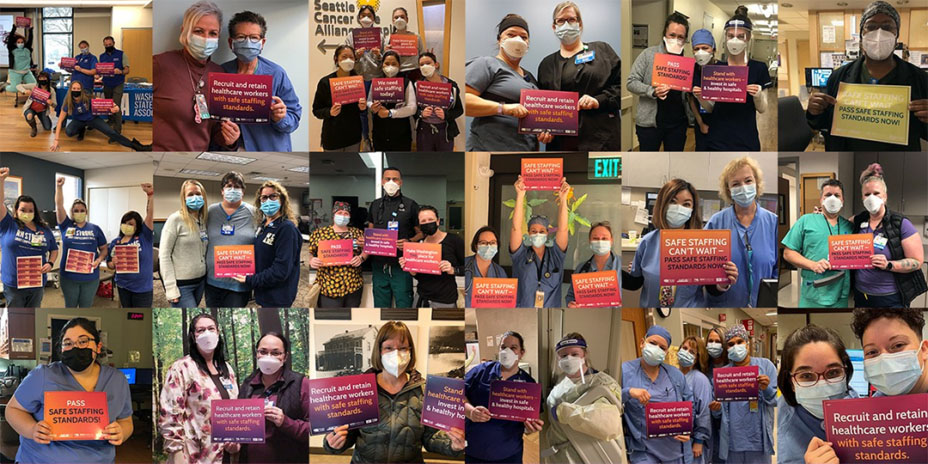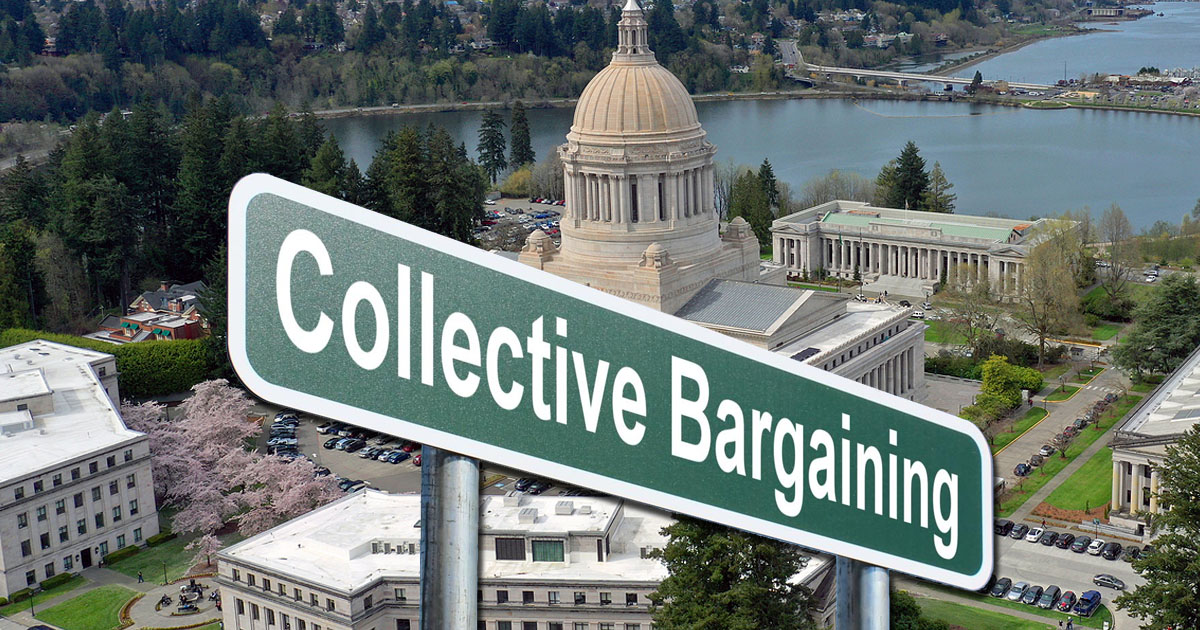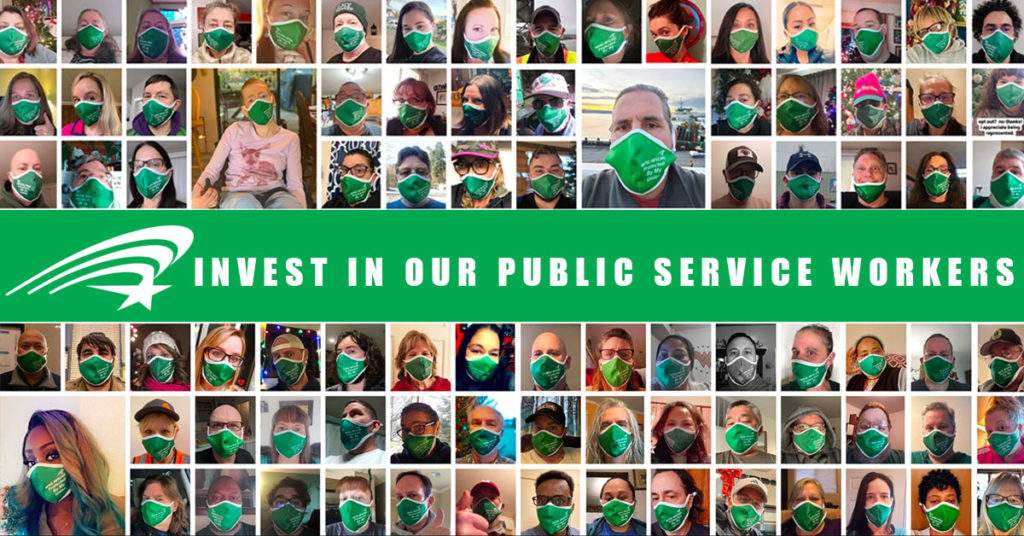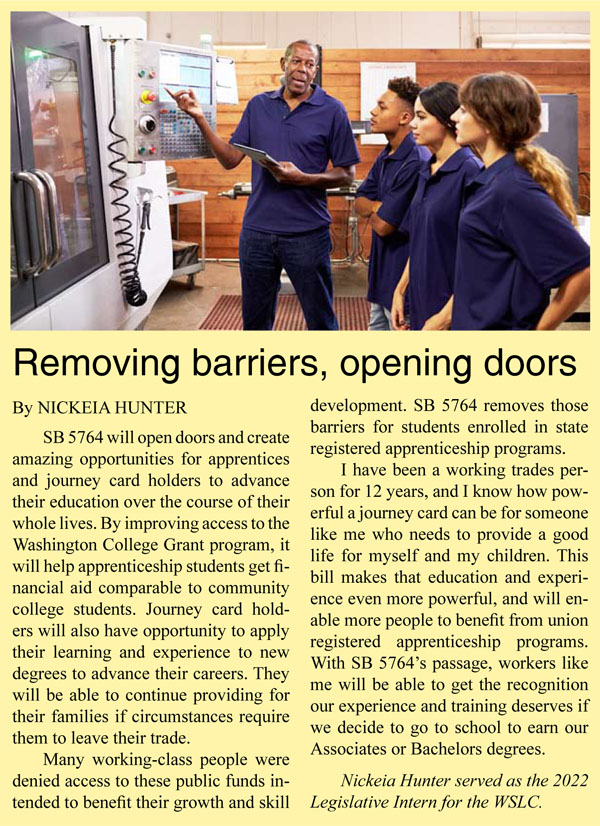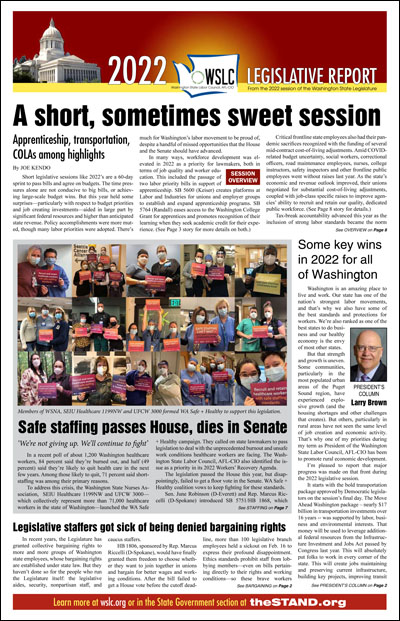 The 2022 edition of the Washington State Labor Council’s Legislative Report is now available. (Download the full 8-page PDF.) This annual report summarizes the fate of legislation affecting working families in each year’s session of the Washington State Legislature, and how each legislator voted on these issues. (You can also download the WSLC 2022 Voting Record only.) Printed copies of the WSLC’s 2022 Legislative Report are being mailed to all affiliated unions. To see previous years’ reports, visit the Legislative Advocacy page.
The 2022 edition of the Washington State Labor Council’s Legislative Report is now available. (Download the full 8-page PDF.) This annual report summarizes the fate of legislation affecting working families in each year’s session of the Washington State Legislature, and how each legislator voted on these issues. (You can also download the WSLC 2022 Voting Record only.) Printed copies of the WSLC’s 2022 Legislative Report are being mailed to all affiliated unions. To see previous years’ reports, visit the Legislative Advocacy page.
Here are just some of the stories in the 2022 Legislative Report:
- A short, sometimes sweet session — Session overview by Joe Kendo
- A major investment in transportation infrastructure
- Some key wins in 2022 for all of Washington — President’s Column by Larry Brown
- WSLC seeks gains for essential workers — Secretary Treasurer’s Column by April Sims
- Safe Staffing passes House, dies in Senate
- Legislative staffers got sick of being denied bargaining rights
- Raises funded; pensions strengthened
- Apprenticeship gets a big boost in 2022
- Siting, permitting improved for clean-energy facilities
- A lifeline for schools and students
- WSLC launches racial equity toolkit
- Labor will be represented on blockchain workgroup — by Sybill Hyppolite
- Some progress on prescription drug affordability
- Get ready for Labor Neighbor — by Cherika Carter
A short, sometimes sweet session
SESSION OVERVIEW
by Joe Kendo, Government Affairs Director
 Short legislative sessions like 2022’s are a 60-day sprint to pass bills and agree on budgets. The time pressures alone are not conducive to big bills, or achieving large-scale budget wins. But this year held some surprises — particularly with respect to budget priorities and job creating investments — aided in large part by significant federal resources and higher than anticipated state revenue. Policy accomplishments were more muted, though many labor priorities were adopted. There’s much for Washington’s labor movement to be proud of, despite a handful of missed opportunities that the House and the Senate should have advanced.
Short legislative sessions like 2022’s are a 60-day sprint to pass bills and agree on budgets. The time pressures alone are not conducive to big bills, or achieving large-scale budget wins. But this year held some surprises — particularly with respect to budget priorities and job creating investments — aided in large part by significant federal resources and higher than anticipated state revenue. Policy accomplishments were more muted, though many labor priorities were adopted. There’s much for Washington’s labor movement to be proud of, despite a handful of missed opportunities that the House and the Senate should have advanced.
In many ways, workforce development was elevated in 2022 as a priority for lawmakers, both in terms of job quality and worker education. This included the passage of two labor priority bills in support of apprenticeship. SB 5600 (Keiser) creates platforms at Labor and Industries for unions and employer groups to establish and expand apprenticeship programs. SB 5764 (Randall) eases access to the Washington College Grant for apprentices and promotes recognition of their learning when they seek academic credit for their experience. (See this report for more details on both.)
Critical frontline state employees also had their pandemic sacrifices recognized with the funding of several mid-contract cost-of-living adjustments. Amid COVID-related budget uncertainty, social workers, correctional officers, road maintenance employees, nurses, college instructors, safety inspectors and other frontline public employees went without raises last year. As the state’s economic and revenue outlook improved, their unions negotiated for substantial cost-of-living adjustments, coupled with job-class specific raises to improve agencies’ ability to recruit and retain our quality, dedicated public workforce. (See this report for details.)
Tax-break accountability advanced this year as the inclusion of strong labor standards became the norm when industries seek incentives. The Washington Motion Picture Competitiveness program, managed by Washington FilmWorks with entertainment trades unions and employers, has been a trailblazer in this regard. Jobs with good wages, quality health care and retirement benefits are ensured before any rebates are issued. That program was greatly expanded this year (HB 1914, Riccelli) and will be able to secure more investments to support our state’s creative economy.
In a similar vein, a renewal and expansion of Washington’s data center tax incentives (HB 1846, Berg) was adopted. It includes new labor standards to ensure that those who build this digital infrastructure are paid area-standard wages. It also incentivizes the use of project labor agreements. HB 1988 (Shewmake), which mirrors this tax break accountability structure for the construction of clean technology manufacturing facilities, also passed as part of the state’s efforts to decarbonize energy production.
Of course, that transition won’t occur and those jobs won’t be realized unless facilities are actually built. HB 1812 (Fitzgibbon) took a significant step forward by reforming energy facility siting and permitting. (See this report for details.)
The 2022 session cannot be considered an unqualified success because some important pro-worker legislation failed to make it to the governor’s desk:
● Safe staffing and patient care standards desperately needed for our healthcare workforce (HB 1868, Riccelli) failed to advance from the Senate Ways and Means Committee, despite strong community support. (See this report for details.)
● An effort to re-empower Labor and Industries to adopt ergonomics standards for certain industries (HB 1837, Bronoske) failed to get a Senate floor vote. This was a particularly disappointing failure in light of House Democrats’ heroic 9.5-hour fight to successfully advance the bill against a Republican filibuster (see House Vote #4).
● HB 1776 (Sells), which would have added prevailing wages to a series of workplaces standards established in 2019 for high-hazard facilities, like refineries, failed to move out of the House despite the original 2019 bill including that policy (it was later altered in the Senate).
● Bills to improve basic healthcare standards for contracted school bus drivers (SB 5326, Robinson) and to provide the barest of protections for railroad workers who use even unpaid sick leave from retaliation (SB 5065, Kuderer) were also denied votes.
All told, an impressive amount of work was accomplished by lawmakers in 2022, though much remains as we continue to adjust to life with COVID-19.
The pandemic has laid bare the inadequacy of standards for workers in health care, and has demonstrated the critical importance of those in our education and public sectors. Critical needs exist to ensure that we are able to recruit and retain workers for these positions, and it will take an even stronger presence by our members to ensure that elected officials step up to the challenge in future years.
Some key wins in 2022 for all of Washington
PRESIDENT’S COLUMN by Larry Brown
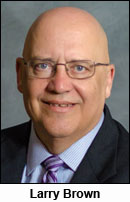 Washington is an amazing place to live and work. Our state has one of the nation’s strongest labor movements, and that’s why we also have some of the best standards and protections for workers. We’re also ranked as one of the best states to do business and our healthy economy is the envy of most other states.
Washington is an amazing place to live and work. Our state has one of the nation’s strongest labor movements, and that’s why we also have some of the best standards and protections for workers. We’re also ranked as one of the best states to do business and our healthy economy is the envy of most other states.
But that strength and growth is uneven. Some communities, particularly in the most populated urban areas of the Puget Sound region, have experienced explosive growth (and the housing shortages and other challenges that creates). But others, particularly in rural areas have not seen the same level of job creation and economic activity. That’s why one of my priorities during my term as President of the Washington State Labor Council, AFL-CIO has been to promote rural economic development.
I’m pleased to report that major progress was made on that front during the 2022 legislative session.
It starts with the bold transportation package approved by Democratic legislators on the session’s final day. The Move Ahead Washington package – nearly $17 billion in transportation investments over 16 years — was supported by labor, business and environmental interests. That money will be used to leverage additional federal resources from the Infrastructure Investment and Jobs Act passed by Congress last year. This will absolutely put folks to work in every corner of the state. This will create jobs maintaining and preserving current infrastructure, building key projects, improving transit and ensuring other mobility options for workers as they begin returning to their workplaces. Importantly, this package does not raise gas taxes at a time when gas prices have skyrocketed due to pandemic-related supply chain issues and oil companies seeking to maximize profits.
Move Ahead Washington was approved essentially on party lines with Democrats in support and Republicans opposed. GOP legislators take the easy vote to approve the projects, but then vote against paying for them. They’ll be at the groundbreaking and ribbon-cutting ceremonies though, to try to take credit.
Another WSLC priority this year was apprenticeship and the Legislature delivered. Two major bills passed that will create family-wage career opportunities for young people across the state. HB 5600, sponsored by Sen. Karen Keiser (D-Des Moines), will expand the capacity and opportunity for state-registered apprenticeship programs. Sen. Emily Randall’s (D-Bremerton) SB 5764 will ensure that apprentices have access to a broad suite of student support services, and greater academic acknowledgement of their education and training.
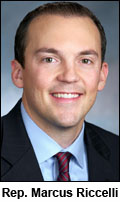
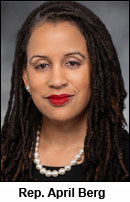 The WSLC was also pleased that the Legislature approved tax incentives that will create jobs in the construction of data centers in central and eastern Washington (HB 1846 by Rep. April Berg) and statewide in the film industry (HB 1914 by Rep. Marcus Riccelli). Over the years, labor hasn’t always been a fan of tax incentives. I can tell you from personal experience that poorly drafted ones — like Boeing’s epic 787 tax incentives — don’t necessarily create jobs. But the ones approved this year are models for how tax incentives should be written to guarantee the promise of good jobs.
The WSLC was also pleased that the Legislature approved tax incentives that will create jobs in the construction of data centers in central and eastern Washington (HB 1846 by Rep. April Berg) and statewide in the film industry (HB 1914 by Rep. Marcus Riccelli). Over the years, labor hasn’t always been a fan of tax incentives. I can tell you from personal experience that poorly drafted ones — like Boeing’s epic 787 tax incentives — don’t necessarily create jobs. But the ones approved this year are models for how tax incentives should be written to guarantee the promise of good jobs.
At the governor’s request, the Legislature also approved an important budget proviso that could help restore thousands of jobs to the Ferndale area, including several hundred good union jobs at the Intalco aluminum smelter. That plant shut down in 2020 and those jobs disappeared, but I’ve been working alongside other labor leaders and state officials with an investment group on a plan to buy that smelter from Alcoa and restart it. Thanks to strong advocacy by Reps. Sharon Shewmake (D-Bellingham) and Alicia Rule (D-Blaine), the state approved $10 million for upgrading and modernizing the smelting process at that facility to reduce emissions. This will help restore the only aluminum manufacturing facility on the West Coast. The final hurdle is getting a power agreement from the Bonneville Power Administration, and we’re continuing to work on that.
There are lots of other important labor-supported bills approved in 2022 that will spread the economic benefit throughout the state. They include streamlining the siting and permitting for energy facilities, prevailing wages for workers with disabilities, union-negotiated raises for our K-12 teachers and state employees, pension improvements for retired public employees, and much more.
As you’ll read in this Legislative Report, we didn’t get everything we wanted. One notable priority that failed to pass was safe staffing standards for healthcare facilities. The WSLC will join the Washington State Nurses Association, SEIU 1199NW and UFCW 3000 in continuing to press for those standards in the future.
I urge all WSLC-affiliated unions to be active participants in the WSLC’s COPE Endorsement Convention on May 21, and also this summer and fall’s critical Labor Neighbor program to inform union members which candidates have earned labor’s support — and why.
Thank you for everything you do to support Washington’s working families.
WSLC seeks gains for essential workers
SECRETARY TREASURER’S COLUMN by April Sims
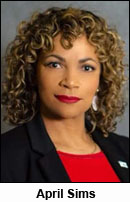
Each session, we fight for better working conditions, expanded rights, and greater protections for working people in Washington. Policy making is one of the powerful tools the labor movement uses to fight for working people and build thriving communities for us all.
This session, we fought for the priorities of essential workers who have shown up for us throughout these pandemic years. We know that gains in these areas have cascading positive effects in our communities. After all, working people are the cornerstones of our communities, and when we win big for workers, we lift up all Washingtonians.
Good schools are fundamental for thriving communities. That’s why HB 1664 (Rule) — which increases the allocation of resources for nurses, social workers, psychologists and counselors in our schools — is so important. It focuses on the mental health and wellbeing of students and ensures that trained professionals can supplement the support students get in the classroom.
With HB 1701 (Bergquist), we won improved retirement benefits for public employees like firefighters who regularly risk their lives on the job. These improvements, passed unanimously, will help ensure the dignified retirement these workers have earned protecting our communities. With SB 5847 (Liias), more public employees will have the opportunity to access the potentially life-changing federal Public Service Loan Forgiveness program.
Public employees provide essential services. In the Legislature, these employees work long hours supporting the democratic process that provides us with the opportunity to win gains for workers. But legislative employees are barred from exercising collective bargaining rights, unlike other public workers. HB 2124 (Riccelli) opens the door to ensuring legislative employees have the basic American right to join together and bargain. To the 61 Republicans that voted against this bill; shame on you for failing to support the workers without whom you could not do your job.
These policies are real gains that benefit real folks. We’re proud of this work, and the partnerships we’ve built with elected officials and community groups to get it done. But the reality is that some meaningful, important legislation was left on the cutting floor this year.
SB 5326 (Robinson) would have required healthcare and retirement benefits for private drivers on par with publicly employed school bus drivers. HB 1837 (Bronoske) would have allowed the state Department of Labor and Industries to issue rules to address preventable but debilitating repetitive stress injuries developed on the job. Unfortunately, both bills failed to advance out of their house of origin.
We’re coming back for these wins in the 2023 session. Working people put their bodies on the line and will continue to fight for the working conditions and compensation we deserve. This year, we’ll see key elections statewide. We’re ready to build on this year’s policy gains and ensure labor champions are elected to fight for us next session, and beyond.
Safe Staffing passes House, dies in Senate
‘We’re not giving up. We’ll continue to fight’
In a recent poll of about 1,200 Washington healthcare workers, 84 percent said they’re burned out, and half (49 percent) said they’re likely to quit health care in the next few years. Among those likely to quit, 71 percent said short-staffing was among their primary reasons.
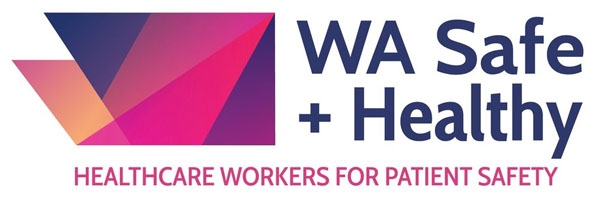 To address this crisis, the Washington State Nurses Association, SEIU Healthcare 1199NW and UFCW 3000 — which collectively represent more than 71,000 healthcare workers in the state of Washington — launched the WA Safe + Healthy campaign. They called on state lawmakers to pass legislation to deal with the unprecedented burnout and unsafe work conditions healthcare workers are facing. The Washington State Labor Council, AFL-CIO also identified the issue as a priority in its 2022 Workers’ Recovery Agenda.
To address this crisis, the Washington State Nurses Association, SEIU Healthcare 1199NW and UFCW 3000 — which collectively represent more than 71,000 healthcare workers in the state of Washington — launched the WA Safe + Healthy campaign. They called on state lawmakers to pass legislation to deal with the unprecedented burnout and unsafe work conditions healthcare workers are facing. The Washington State Labor Council, AFL-CIO also identified the issue as a priority in its 2022 Workers’ Recovery Agenda.
The legislation passed the House this year, but disappointingly, failed to get a floor vote in the Senate. WA Safe + Healthy coalition vows to keep fighting for these standards.
Sen. June Robinson (D-Everett) and Rep. Marcus Riccelli (D-Spokane) introduced SB 5751/HB 1868, which would create new safe staffing standards for hospitals in Washington state. This would help protect healthcare workers and ensure patients get the care they deserve.
HB 1868/SB 5751 would have addressed the hospital staffing crisis by:
● Creating safe staffing standards that protect any one healthcare worker from dangerously high patient loads and creating adequate enforcement mechanisms to ensure hospitals follow safety standards;
● Closing loopholes and enforcing existing break and overtime laws to ensure hospitals are complying with already-passed legislation to ensure healthcare workers get legally-required meal and rest break time, as well as ending the current abuse of mandatory overtime.
HB 1868 passed the House 55-43 and advanced from the Senate Labor, Commerce & Tribal Affairs Committee, but died in Senate Ways and Means Committee.
After HB 1868 died in the Senate, the executive officers of the three unions that comprise WA Safe + Healthy released a statement that reads (in part):
Thousands of healthcare workers, patients, and patient advocacy groups sent letters to their lawmakers, testified in committee, and added their names in support of safe staffing standards, and 74 percent of Washington voters supported creating safe staffing standards. By not passing safe staffing standards this session, a handful of lawmakers have allowed hospital executives to continue putting profits above patient care.
But we’re not giving up. We’ll continue to fight for safe staffing standards, whether in the Legislature, at the bargaining table, or on the ballot. We need these critical protections, for the health and safety of Washington healthcare workers and patients.
The WSLC shares that coalition’s determination to pass safe staffing standards, and we will strongly support those efforts moving forward.
Legislative staffers got sick of being denied bargaining rights
In recent years, the Legislature has granted collective bargaining rights to more and more groups of Washington state employees, whose bargaining rights are established under state law. But they haven’t done so for the people who run the Legislature itself: the legislative aides, security, nonpartisan staff, and caucus staffers.
HB 1806, sponsored by Rep. Marcus Riccelli (D-Spokane), would have finally granted them freedom to choose whether they want to join together in unions and bargain for better wages and working conditions. After the bill failed to get a House vote before the cutoff deadline, more than 100 legislative branch employees held a sickout on Feb. 16 to express their profound disappointment. Ethics standards prohibit staff from lobbying members—even on bills pertaining directly to their rights and working conditions—so these brave workers were supported in committee hearings by their former coworkers and lobbyists representing organized labor, including IBEW, IUPAT and WPEA.
But Rep. Riccelli didn’t give up. Days later, he introduced HB 2124 to create a labor relations office, a timeline for bargaining, and require interim work for legislation next year to grant legislative staffers bargaining rights. With just days remaining in the session, SB 2124 passed the House 57-41, passed the Senate 28-20, and was signed into law by Gov. Jay Inslee.
But bargaining rights stymied for others
Unfortunately, other workers seeking expanded bargaining rights were not as successful in advancing their cause. Physicians working as Residents at University of Washington Hospitals supported HB 1764 (Sells) to provide for interest arbitration due to the employer’s recalcitrance at the bargaining table. Given the important and life-saving work these doctors perform, their ability to withhold their labor is functionally limited, similar to firefighters and correctional officers who are able to use interest arbitration to settle contract disputes. HB 1764 failed to advance from the House.
State employees employed as part of Washington Management Service (WMS), a decentralized personnel system established for managers in state government agencies, also sought basic collective bargaining rights this session. SB 5579 (Hunt) would have removed the bargaining exemption for WMS. It was sought by a group of Lieutenants from the Department of Corrections with support from Teamsters 117 and WFSE.
It is not uncommon for supervisors and other managers to have collective bargaining rights, especially in public safety agencies like fire departments and police agencies. It can be difficult to recruit candidates to front-line supervisory positions if those workers lose the voice and protections they have with their unions. Even as managers they need representation on the job and the ability to bargain for better pay and working conditions. SB 5579 did not advance from Senate Ways and Means Committee.
The expansion of bargaining rights for legislative staff is truly something to celebrate, and Washington’s labor community stands ready to support these workers if they choose to join together in unions. We must also be ready to support the advancement of other workers as they seek the ability to collectively bargain contracts that help establish better lives.
Raises funded; pensions strengthened
Heading into the 2021-23 biennium at the height of the COVID-19 pandemic, state employees responded to budget uncertainty in 2020 by agreeing to collective bargaining agreements with no general wage increases for two years and monthly one-day furloughs for most workers. Those 24 furlough days would have equated to a 4.6% pay reduction.
It turns out that the state economy didn’t take the hit that many predicted and the biennial budget enacted in 2021 did not require those furloughs. But there were still no scheduled wage increases.
Recognizing pressures on the frontline workers of our state workforce who continued providing essential services throughout the pandemic as living costs continued to rise—and given Washington’s improved economic and revenue projections—public employee unions were able to reopen contract bargaining and negotiate for cost-of-living raises and other adjustments. Under the revised agreements, most state employees are scheduled to receive a 3.25% general wage increase on July 1, 2022. In addition, lower-wage workers will receive a graduated lump sum payment based on annual income. Due to tightening labor markets and increased resignations, targeted base range increases were negotiated for certain critical job classifications.
K-12 teachers and college faculty also sought and secured meaningful pay increases as the Legislature grappled with how best to support our schools that have been so severely tested over the last two years.
Gov. Jay Inslee’s budget proposal provided for these increases and the Legislature ultimately approved a $64 billion supplemental operating budget that funded these union-negotiated raises for state employees, corrected K-12 COLAs, and supported behavioral health, child care, and homecare workers.
Meanwhile, Washington’s labor movement continues to support strong public pensions. This retirement cornerstone has eroded away in the private sector and in states with underfunded public pensions. But in Washington, we have maintained robust public pension plans, and in 2022, public employee unions were able to secure an expansion of benefits.
 Workers covered by the Law Enforcement and Fire Fighters Plan 2, lead by the Washington State Council of Fire Fighters, achieved a huge victory with the passage of HB 1701 (Bergquist). It will increase the benefit multiplier for LEOFF 2 members from 2.0% to 2.5% for service years between 15 and 25, while also providing a one-time lump sum for current retirees of $100 per month of service. For those who were disabled in the line of duty, and for the survivors of those who lost their lives, a minimum $20,000 benefit will also be paid.
Workers covered by the Law Enforcement and Fire Fighters Plan 2, lead by the Washington State Council of Fire Fighters, achieved a huge victory with the passage of HB 1701 (Bergquist). It will increase the benefit multiplier for LEOFF 2 members from 2.0% to 2.5% for service years between 15 and 25, while also providing a one-time lump sum for current retirees of $100 per month of service. For those who were disabled in the line of duty, and for the survivors of those who lost their lives, a minimum $20,000 benefit will also be paid.
Other public safety workers, like correctional officers and employees at state behavioral health hospitals, who are part of the Public Safety Employee Retirement System will see disability benefit improvements with passage of HB 1669 (Stokesbary).
And for teachers and public employees who retired under PERS and TRS plans 1 (which were closed in 1977), the Legislature passed SB 5676 (Conway) to provide a one-time cost-of-living adjustment of 3%. This is particularly important as Plan 1 retirees, for the most part, do not have annual adjustments to help maintain their purchasing power.
All of these raises and pension gains were made possible by union membership. It gives public employees a powerful voice to protect their rights, jobs, pay, benefits and public services—plus a powerful voice in the Legislature. If you are a public employee, make sure you are a union member and actively participate in your union’s legislative advocacy.
Apprenticeship gets a big boost in 2022
One of the priority issues on the 2022 legislative agenda of the Washington State Labor Council, AFL-CIO was expanding apprenticeship opportunities so more people can “earn while they learn” and pursue family-wage careers.
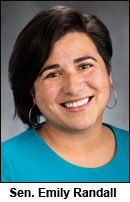
 Significant progress was made on that front with the passage of SB 5600 sponsored by Sen. Karen Keiser (D-Des Moines) and SB 5764 by Sen. Emily Randall (D-Bremerton). Both bills were signed into law by Gov. Jay Inslee on March 24.
Significant progress was made on that front with the passage of SB 5600 sponsored by Sen. Karen Keiser (D-Des Moines) and SB 5764 by Sen. Emily Randall (D-Bremerton). Both bills were signed into law by Gov. Jay Inslee on March 24.
SB 5600 will expand apprenticeships across the board. Building on work done by the building trades, as well as the new state initiative Career Connect Washington, it will expand capacity and opportunity for current state-registered apprenticeship programs, and allow L&I to award grants to those programs to upgrade equipment necessary to the program. SB 5600 passed the Senate 36-13 and the House 94-4.
“The earn-while-you-learn approach, with both classroom instruction and supervised on-the-job training, makes apprenticeships accessible to many—especially women and people of color—who can’t take time off work or afford to go to a traditional college or university,” Keiser said. “We can build a more diverse and expanded apprenticeship system that opens the door to a successful future for so many more Washingtonians.”
Randall’s SB 5764 will ensure that apprentices have access to a broad suite of student support services, and greater academic acknowledgement of their education and training. It will also help successful apprenticeship graduates have a clearer pathway to earn an associate degree or four-year bachelor’s degree in the future, if they choose. SB 5764 passed the Senate 49-0 (Vote #9) and the House 94-2 (Vote #8).
“Many have built their educational and career journeys with our nation-leading apprenticeship programs,” Randall said. “We can do a better job of recognizing and honoring their many hours of on-the-job learning they’ve invested, and make sure they get credit for that if they want to pivot and grow in their careers.”
Siting, permitting improved for clean-energy facilities
Another legislative priority for Washington’s labor movement in 2022 was to promote clean energy production by reforming the state’s siting and permitting process for new energy facilities. In recent years, the Legislature has passed a series of laws to reduce the state’s greenhouse gas emissions by mandating a transition to carbon-free energy production, capping and pricing carbon emissions, and requiring low-carbon transportation fuels. But the infrastructure necessary to achieve the policies is sorely lacking. That’s because the siting and permitting process for new energy facilities, and the manufacturing supply chain necessary to build those facilities, often stymies their construction.
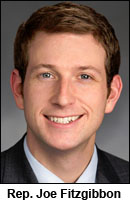 Sponsored by Rep. Joe Fitzgibbon (D-Seattle), HB 1812 will improve and expand state siting and permitting processes to speed the development of this critical infrastructure, while preserving the protective nature of our environmental regulations and ensuring tribal governments and community stakeholders are respected.
Sponsored by Rep. Joe Fitzgibbon (D-Seattle), HB 1812 will improve and expand state siting and permitting processes to speed the development of this critical infrastructure, while preserving the protective nature of our environmental regulations and ensuring tribal governments and community stakeholders are respected.
HB 1812 establishes the Energy Facility Site Evaluation Council as a standalone agency so it is adequately funded to process more project proposals; reduces uncertainty by defining issues before adjudication processes begin; provides pre-application assistance to potential applicants; and includes timely outreach to tribes, government agencies and community stakeholders to identify potential challenges or missing information before an application is submitted.
The bill passed the House 95-3 and the Senate 29-20. Gov. Jay Inslee partially vetoed sections regarding a stakeholder study that was not funded in the current budget, but the substance of the bill remains intact and is now law.
The Washington State Labor Council, AFL-CIO believes these reforms will not only promote clean energy production in Washington, they could attract manufacturing facilities that build industrial scale batteries, electric and clean fuel vehicles, and the carbon-free electricity storage necessary to make a clean grid responsive to consumer demand. HB 1812 accomplishes all this while creating more job opportunities for workers in construction and manufacturing.
A lifeline for schools and students
The COVID-19 pandemic has had a broad impact on all of our lives. But perhaps the most affected among us have been schoolchildren and their public education system. First came the challenges of remote learning; then prioritizing the safety and health of students and educators as they returned to class.
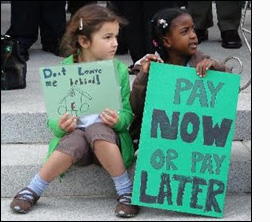 But the pandemic also had the potential to wreak havoc on school district budgets and ongoing staffing challenges. Because school funding in Washington is based on enrollment, which suffered unprecedented declines due to COVID-19, the Washington Education Association prioritized stabilizing school funding and avoiding disruptions of student learning.
But the pandemic also had the potential to wreak havoc on school district budgets and ongoing staffing challenges. Because school funding in Washington is based on enrollment, which suffered unprecedented declines due to COVID-19, the Washington Education Association prioritized stabilizing school funding and avoiding disruptions of student learning.
HB 1590, sponsored by Rep. Laurie Dolan (D- Olympia), stabilized funding for K-12 schools facing enrollment fluctuation in order to maintain continuity of educational services. Unfortunately, it faced the toxic politics of our time when the bill’s opponents claimed that enrollment drops were not due to COVID, but because students are being indoctrinated with gender ideology and Critical Race Theory. (Spoiler: they aren’t.) In the end, thanks to compelling testimony and advocacy from WEA members, HB 1590 passed the House 62-36, passed the Senate 28-21, and was signed into law by Gov. Jay Inslee.
The pandemic also exposed the gulf between the physical, social and emotional support that students need and the resources our state has committed to filling those needs. So this year, WEA also prioritized legislative support for students’ behavioral and mental health so that they can better learn.
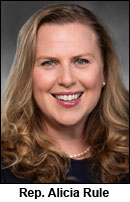 HB 1664, sponsored by Rep. Alicia Rule (D-Blaine), phases in a considerably larger state investment in counselors, school nurses, social workers and psychologists. It passed the House 74-24, the Senate 45-2, and was signed by Inslee. The Legislature changed the funding formula for K-12 schools to include $91 million more for these providers of physical, social and emotional support so when students need help, they’ll have better access to that help.
HB 1664, sponsored by Rep. Alicia Rule (D-Blaine), phases in a considerably larger state investment in counselors, school nurses, social workers and psychologists. It passed the House 74-24, the Senate 45-2, and was signed by Inslee. The Legislature changed the funding formula for K-12 schools to include $91 million more for these providers of physical, social and emotional support so when students need help, they’ll have better access to that help.
In addition to these priorities, the WEA also teamed up with AFT Washington, the Washington Nurses Association and student groups to make higher education and career training more accessible.
HB 1835, sponsored by Rep. Drew Hansen (D-Bainbridge Is.), will make a greater investment in low-interest student loans and more student outreach to promote the Washington College Grant (WCG), which is one of the most generous financial aid programs in the country. WCG gives high school graduates and working-age adults from low- and middle-income families money for college or career training. Focus groups at community and technical colleges found only 50 percent of students knew the WCG was available and that it doesn’t need to be repaid. HB 1835 passed both houses and was signed into law.
WSLC launches Racial Equity Toolkit
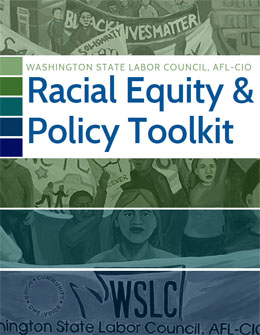 During the 2022 legislative session, the Washington State Labor Council, AFL-CIO officially launched its new WSLC Racial Equity & Policy Toolkit, expanding the council’s ground-breaking work on Race and Labor through public policy approaches.
During the 2022 legislative session, the Washington State Labor Council, AFL-CIO officially launched its new WSLC Racial Equity & Policy Toolkit, expanding the council’s ground-breaking work on Race and Labor through public policy approaches.
To meet the needs of union members, working people and growing demand for racial and economic justice in our state, this customized tool will help the United Labor Lobby, a statewide coalition of union and advocacy groups, promote racial equity in policy creation and support. WSLC Government Affairs Director Joe Kendo and WSLC Legislative Director Sybill Hyppolite will work with WSLC affiliates to use this toolkit in developing the council’s agenda for future legislative sessions.
“It is our hope that this toolkit and the practice of engaging the voices, leadership, needs, and power of Black & Indigenous and all People of Color will extend beyond legislative policy and permeate our unions halls and the decisions we make daily to strengthen the labor movement,” wrote WSLC executive officers Larry Brown and April Sims in the toolkit’s introduction.
In addition to the toolkit, the WSLC has created a series of workshops in partnership with Marlysa Gamblin of www.gamblinconsults.com to establish a baseline for racial equity concepts in policy.
Check out the WSLC Racial Equity & Policy Toolkit online. It will serve as a guide for the WSLC’s legislative program as the council continues to build power for all working people and integrate racial equity into all that it does.
Labor will be represented on blockchain workgroup
by Sybill Hyppolite, Legislative Director
 Under Washington law, blockchain is defined as “a cryptographically secured, chronological, and decentralized consensus ledger or consensus database maintained via Internet, peer-to-peer network, or other similar interaction.”
Under Washington law, blockchain is defined as “a cryptographically secured, chronological, and decentralized consensus ledger or consensus database maintained via Internet, peer-to-peer network, or other similar interaction.”
Um… what?
Basically, blockchain is a type of shared database that differs from a typical database in how it stores information. Blockchains store data in blocks that are then linked together via cryptography. Even more basically, it’s a system of recording information in a way that makes it difficult or impossible to change, hack, or cheat the system.
If you’re still confused—and many are—you may be wondering why the Washington State Legislature’s involved. It’s because this technology, used most prominently for cryptocurrency, is likely to transform the world’s economy. It has the potential to affect every industry; not just finance, but also health care, music, real estate, social networks, telecommunications, supply chain management, higher education, public record keeping… you name it. In a recent survey of Fortune 500 companies, 94% reported they have projects planned using blockchain technology.
This raises important questions about how these changes will affect workers and inequality. How will it affect jobs and working conditions? What opportunities do these technologies offer for reducing racial and economic divides?
SB 5544, sponsored by Sen. Sharon Brown (R-Kennewick) and supported by the IBEW and the Washington State Labor Council, AFL-CIO, establishes a state workgroup to study these critical issues and report back to the Governor and Legislature by Dec. 1, 2023. That workgroup will include two individuals representing the WSLC who work in the fields impacted by blockchain technology or its applications. SB 5544 passed with near unanimous support and was signed into law by Gov. Jay Inslee.
Labor organizations are an important part of this conversation for a number of reasons, including:
● Changes to the conditions of work. Businesses are already relying on blockchain technologies and will increasingly do so. Changes in business practices—such as advertising and marketing, human resources, accounting, IT and cybersecurity and management—mean changes for the conditions of work.
● Jobs and the environment. Blockchain has given rise to new industries, such as cryptocurrency mining, which can impact both job creation and the environment.
● Cryptocurrency. Blockchain technology also is shifting the financial investment landscape. Labor organizations bargain—and often steward—retirement benefits and are important stakeholders in this space.
The WSLC will be working with its affiliated unions to ensure a range of worker concerns are lifted up in this blockchain workgroup, and we are grateful that lawmakers saw the importance of including workers’ perspectives in this critical work.
Some progress on prescription drug affordability
Health care isn’t accessible if it’s not affordable.
That’s why the Washington State Labor Council, AFL-CIO continues to advocate for lower health care costs and in 2022 progress was made in addressing one of the system’s biggest cost drivers: prescription drugs.
SB 5532, sponsored by Sen. Karen Keiser (D-Des Moines) will establish a prescription drug affordability board. The state board would identify and conduct affordability reviews of drugs that either are priced at excessive levels or that have sharply increased in price. Supporters of the bill, including the WSLC, testified that this board will be a useful tool for restraining egregious price increases for lifesaving drugs, particularly those that have been on the market for years.
SB 5532 passed the Senate 29-20 and the House 57-39 largely on party lines with Democrats in support and Republicans siding with the pharmaceutical industry in opposition. Similar legislation was approved in 2020, but was vetoed by Gov. Jay Inslee (along with many other bills as a pandemic cost-saving measure). This year, Inslee signed SB 5532 into law.
Also approved in 2022 was Keiser’s SB 5546 capping consumers’ out-of-pocket costs for insulin. This life-saving medication has been used for a century, but for some reason, its cost has skyrocketed by more than 50 percent in recent years. Under SB 5546, health plans must cap the total amount that an enrollee must pay for a 30-day supply of insulin at $100 through 2022, and the Health Care Authority will monitor the drug’s price.
Get ready for Labor Neighbor
by Cherika Carter, Political and Strategic Campaigns Director
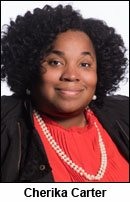 This Legislative Report is full of stories about the importance of electing pro-worker lawmakers. This year in both Olympia and Washington, D.C., they made job-creating infrastructure investments, boosted apprenticeship, and bolstered pensions.
This Legislative Report is full of stories about the importance of electing pro-worker lawmakers. This year in both Olympia and Washington, D.C., they made job-creating infrastructure investments, boosted apprenticeship, and bolstered pensions.
But clearly there is more to be done. Priorities in this Washington like hospital safe staffing, and in that Washington like PRO Act labor law reform are just a few votes from becoming reality.
That’s why the 2022 elections will be critical in determining whether we keep making progress building worker power or if we suffer setbacks. We need to work as hard as ever to ensure that champions of working families get elected to public office.
In our state, we are fortunate to have many champions who are incumbents and need our support for re-election. But there are also an unusually high number of open state legislative seats in 2022 due to retirements.
 Labor Neighbor, the WSLC grassroots member-to-member political education program, will once again be leafletting, calling and mailing union families across the state to explain which candidates have earned their union’s support, and why. So when you get that call from me to get involved—and you will—remember that this is about more than sacrificing a few evenings on the phones or a few Saturdays on neighborhood walks. This is about protecting our jobs, our families, and our quality of life.
Labor Neighbor, the WSLC grassroots member-to-member political education program, will once again be leafletting, calling and mailing union families across the state to explain which candidates have earned their union’s support, and why. So when you get that call from me to get involved—and you will—remember that this is about more than sacrificing a few evenings on the phones or a few Saturdays on neighborhood walks. This is about protecting our jobs, our families, and our quality of life.
I’ll talk to you soon.
There are many more stories in the 2022 Legislative Report. Download the PDF to read them all.
